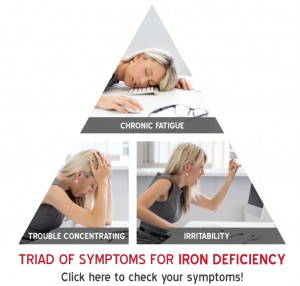Today, in honour of Heart Month, I want to talk about the link between iron deficiency and heart failure because it’s far more common than you might realize.
According to a paper published in the Cardiology Journal Heart, iron deficiency is present in 30 – 50% of patients with heart failure and has been associated with poorer medical outcomes including a higher risk of death.
What is Heart Failure?
Heart failure (often referred to as congestive heart failure) occurs when the heart is unable to efficiently pump blood throughout the body, especially when activity is increased. In addition to other possible causes, this can happen when the heart is left damaged, stiff, or weakened as a result of conditions such as coronary artery disease, heart attack, cigarette smoking, hypertension, cardiomyopathy, obesity, etc. Over time, the heart can no longer keep up with the demands placed upon it. Heart failure in these cases most often involves the left side of the heart (left ventricle). Heart failure can be chronic (ongoing) or acute (begin suddenly), depending on the cause.
How Iron Deficiency Affects the Heart
Since iron helps carry oxygen throughout the body, when iron is in low supply hemoglobin – which carries oxygen – is decreased in your blood. This causes your heart to have to work harder in order to provide the same amount of oxygen to your organs. Gradually, your heart muscles will become enlarged (muscular hypertrophy). Think about your biceps, for example – the more it is worked the bigger it gets, right? Well, don’t forget that the heart is also a muscle that can get bigger; however, this is not good because when the muscles in the heart’s walls become thicker it causes stiffness, resulting in reduced contractibility of the walls and capacity in the ventricle.
This is not the only way the heart is affected when it tries to adapt to the increased workload. It can also experience:
- Increased heart rate in order to maintain greater cardiac output
- Increased oxygen need of cardiac muscles due to increased work load
This all leads to the inability of your heart to meet demands during strenuous physical activity, and as the condition progresses, this will even occur when your body is at rest.
Anemia is found in as high as 50% of patients with heart failure. Anemia can worsen cardiac function and add further stress to the heart, which may lead to (or worsen) heart failure. Furthermore, anemia has also been associated with an increased risk of mortality. It is for these reasons that treating iron deficiency anemia is particularly important as it may reduce the risk of heart failure and related mortality.
Symptoms
I can’t stress enough how important it is to know the signs and symptoms of iron deficiency! In addition to the most common triad of symptoms (inability to concentrate, irritability and chronic fatigue), you should also be on guard for:
- Chest pain
- Rapid heartbeat
- Shortness of breath
- General weakness
- Pale skin
- Headache
Interestingly, many of these symptoms can be present in heart failure. Signs and symptoms of heart failure can include:
- Chest pain
- Irregular or rapid heartbeat
- Shortness of breath on rest or upon exertion
- Fatigue, weakness and/or reduced ability to exercise
- Difficulty concentrating
- Swelling of the abdomen or legs, ankles and feet
- Persistent phlegmy cough (white or pink coloured) or wheezing
- Lack of appetite and nausea
- Sudden weight gain because of fluid retention
If you are experiencing any of the symptoms listed above, speak to your doctor. Also, call 9-1-1 if you are experiencing any of the symptoms listed above in addition to the following symptoms (as this may indicate a more severe condition that may require urgent attention):
- Chest discomfort
- Pain or discomfort in the upper body
- Shortness of breath (with or without chest discomfort)
This month’s articles are dedicated in loving memory of my parents, Leo Dove (who suffered a catastrophic stroke in 1993 and passed in 1996) and Alice Dove (who suffered her first and fatal heart attack in 2001). The woman I am today, I am because of you. The best treatment for heart and stroke is prevention.
Content and advice provided on The Iron Maiden is for information purposes only and should not serve as a substitute for a licensed health care provider, who is knowledgeable about an individual’s unique health care needs



Thanks Leona for this blog I am particularly a person who has had heart failure in the past and this may be why I was anemic for a long time you have been my savoir and I’m greatfull for your help in getting my iron deficiency under control
Can I ask a question? I had many years of severe anaemia because I had very heavy periods due to fibroids. I had blood transfusions and then a hysterectomy. But my question is: – could my heart be damaged after so many years of exertion and duress due to being anaemic long term? I’m healthy now and I exercise a lot, but sometimes I wonder if my heart is “normal” after the bad experience I’ve had. Does the heart heal after chronic anaemia?
Hi Aviva,
If you look back to a series of posts in February 2015, I believe you will find an article about how low iron effects the heart.
The heart, like any muscle, needs oxygen to function. Unlike other muscles, your heart must beat regardless of the fact that oxygenation is optimized or not. At the peak of your anemia, your heart would have worked harder to get more blood to your vital organs. Depending on how long your heart was operating at peak capacity with insufficient oxygen there may or may not have been some damage to the heart muscle.
If you are concerned enough to ask here it might be something you would like to ask your healthcare provider about.
I trust your anemia is now resolved, checking that would be a great jumping off point.
Let us know what you find out!